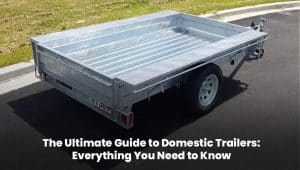The Ultimate Guide to Domestic Trailers: Everything You Need to Know

Your complete guide to domestic trailers — from types and features to maintenance and buying tips.
Whether you’re a homeowner with a DIY project, a small business owner making local deliveries, or an adventurer planning a weekend getaway, a domestic trailer is an invaluable asset. These versatile haulers are designed to handle a wide range of tasks, from moving furniture to transporting landscaping materials and recreational gear. But with so many options available, how do you choose the right one? This comprehensive guide will walk you through the key aspects of domestic trailers, helping you make an informed decision that suits your specific needs.
Understanding the Different Types of Domestic Trailers
Domestic trailers come in various shapes and sizes, each built for a particular purpose. Knowing the distinctions is the first step in finding your perfect match.
- Box Trailers: Also known as cargo trailers, these are enclosed trailers with solid walls. They are excellent for protecting goods from the elements and securing valuable items like tools, furniture, or equipment. Their robust design makes them a popular choice for movers and small businesses.
- Flatbed Trailers: As the name suggests, these trailers have a flat, open bed with no sides or roof. They are incredibly versatile and ideal for hauling bulky or oddly shaped items such as timber, machinery, or vehicles. They are a staple for construction crews and landscapers.
- Cage Trailers: A variation of the flatbed, cage trailers feature high mesh sides that prevent items from falling off. They are perfect for transporting loose materials like garden waste, soil, or luggage, offering extra security without the full enclosure of a box trailer.
- Tilt Trailers: These trailers have a unique tilting mechanism that allows the entire bed to be lowered to the ground, making it easy to load heavy items or equipment without the need for a ramp. They are a favourite among those who frequently transport ATVs, motorcycles.
Key Factors to Consider Before Buying
Choosing a trailer isn’t just about picking a type; it’s about considering several crucial factors to ensure safety, durability, and a good return on your investment.
- Load Capacity and Weight: This is arguably the most important factor. You must choose a trailer with a Gross Vehicle Mass (GVM) rating that can safely accommodate the weight of your heaviest anticipated load. Overloading a trailer is not only dangerous but also illegal. Always match the trailer’s capacity to your towing vehicle’s capabilities.
- Material and Construction: Look for trailers made from high-quality, durable materials. Galvanised steel is a popular choice for its resistance to rust and corrosion, making it a long-lasting option. The quality of the chassis, axles, and suspension system will determine the trailer’s longevity and performance.
- Braking System: For heavier trailers (typically those with a GVM over 750kg), a braking system is a legal requirement in many regions. Mechanical override brakes or hydraulic brakes provide an extra layer of safety, especially when navigating hilly terrain or stopping suddenly.
- Coupling and Hitch: The coupling is the part of the trailer that connects to your vehicle’s tow ball. Ensure the coupling is rated for the trailer’s GVM and is compatible with your towing vehicle. A well-designed coupling ensures a secure and stable connection.
- Accessories and Customisation: Many trailers can be customised with a range of accessories to better suit your needs. Common additions include jockey wheels, spare tyre mounts, ramps, and custom tie-down points. These can significantly enhance the functionality and convenience of your trailer.
FAQ (Frequently Asked Questions)
Q: What is the difference between a single-axle and a tandem-axle trailer?
A: A single-axle trailer has one set of wheels, making it lighter and easier . A tandem-axle trailer has two sets of wheels, providing better stability and a higher load capacity. Tandem-axle trailers are generally preferred for heavier loads or longer trips.
Q: Do I need a special license to tow a domestic trailer?
A: In most places, a standard driver’s license is sufficient for towing a domestic trailer, provided the combined weight of the trailer and your vehicle (Gross Combined Mass) does not exceed a certain limit. Always check your local transportation regulations to be sure.
Q: Can I use my trailer for business purposes?
A: Yes, many domestic trailers are perfectly suited for small business use, from landscaping and construction to delivery services. However, you should ensure your trailer meets all legal requirements for commercial use and that you have appropriate insurance.





